

Veal is a type of meat that comes from calves and is a great source of lean protein for dogs. It contains iron and B vitamins, making it a nutrient-rich addition to a dog’s diet.
Veal is high in iron, which promotes red blood cell production and prevents anemia in dogs. It’s also an excellent source of protein, aiding in muscle development and tissue repair. Additionally, veal is rich in niacin, vitamins B6 and B12, and zinc, which can boost energy levels and regulate organ functions in dogs. Compared to beef, veal is more tender, easier to digest, and has lower fat and cholesterol content.
Some dogs may be allergic to veal, resulting in symptoms such as skin itchiness, flatulence, and diarrhea. It’s important to monitor your dog for any adverse reactions when introducing veal to their diet.
Veal can be served raw or cooked. If including veal in a raw food diet, ensure that it comes from trusted suppliers of grass-fed livestock. It’s important to follow proper food safety guidelines when preparing veal for your dog and to consult with a veterinarian to determine the appropriate serving size for your pet.
Veal, also known as calf meat, is a great source of lean protein for dogs. It's rich in iron, B vitamins, and zinc, which support red blood cell production, muscle development, and organ functions in dogs. Veal is also more tender and easier to digest than beef, with lower fat and cholesterol content. However, some dogs may have allergies to veal, resulting in skin itchiness, flatulence, or diarrhea. It's important to monitor your dog for any adverse reactions and consult with a veterinarian before adding veal to their diet. Veal is widely available and affordable, and can be served raw or cooked in proper serving sizes. For those who wish to avoid veal or for dogs with allergies, chicken or turkey can be great alternatives. Have you tried adding veal to your dog's diet? How did they like it? Remember to always consult with your veterinarian before introducing any new food to your pet.